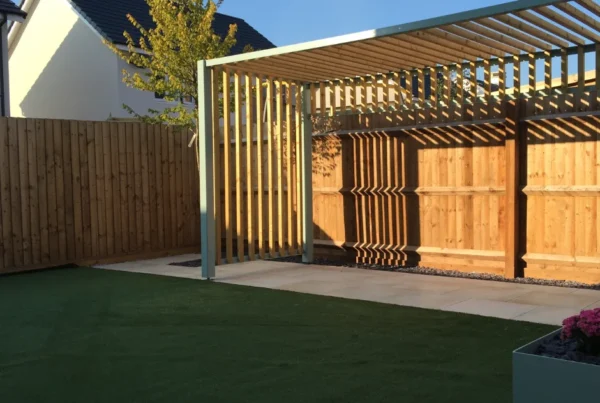In recent years, there has been a growing interest in eco-conscious gardening practices, driven by a desire to minimise environmental impact and promote sustainability. As more people recognize the importance of preserving our planet, they are seeking ways to reduce their ecological footprint, even in their own back gardens.
One significant aspect of eco-conscious gardening is the choice of materials and construction methods used for garden structures, such as sheds, pergolas, decking and garden rooms. In this blog post, we will explore the benefits of ground screw shed bases as a sustainable foundation solution for eco-conscious gardens.
Understanding the Environmental Benefits of Ground Screw Shed Bases
Traditional shed bases, often constructed using concrete slabs or blocks, can have a significant environmental impact. Concrete production is known to be energy-intensive and generates substantial carbon emissions, contributing to climate change. Additionally, the excavation required for installing concrete bases can disrupt soil ecosystems and harm plant roots, impacting biodiversity in the garden.
Ground screw shed bases offer a more sustainable alternative, minimising soil disturbance and reducing environmental impact. These innovative ground anchors are installed without the need for excavation, preserving soil structure and minimising disruption to plant roots. Furthermore, ground screws have a lower carbon footprint compared to concrete, making them a greener choice for eco-conscious gardeners.
Learn more about concrete verses ground screws here.
Eco-Conscious Garden Design Principles
Eco-conscious garden design is centred around principles that promote sustainability, biodiversity, and environmental stewardship. By incorporating these principles into garden planning, homeowners can create beautiful and functional outdoor spaces that are in harmony with nature. Some key principles of eco-conscious garden design include:
- Biodiversity: Encouraging a diverse range of plant and animal species in the garden to support ecosystem health and resilience.
- Water Conservation: Implementing water-saving techniques such as rainwater harvesting, drip irrigation, and drought-tolerant plantings to minimise water usage.
- Soil Health: Practising organic gardening methods, composting, and mulching to improve soil fertility and structure, promoting healthy plant growth.
- Chemical Reduction: Minimising the use of synthetic pesticides and fertilisers to protect pollinators, beneficial insects, and soil organisms.
Check out some more practical ways to implement these principles into your garden here.
Practical Steps for Implementing Ground Screw Shed Bases
Transitioning to ground screw shed bases in your garden requires careful planning and execution. Here are some practical steps to consider when incorporating ground screws into shed base construction:
- Site Assessment: Evaluate the location and terrain of your garden to determine the most suitable placement for your shed. Consider factors such as soil type, drainage, sun exposure, and proximity to existing structures or trees.
- Ground Screw Installation: Once you have identified the ideal location for your shed, the Stop Digging team can prepare the ground for ground screw installation. They will use a ground screw driver or auger to drill the screws into the soil to the required depth, ensuring they are securely anchored.
- Shed Placement: Then you are free to position the shed on top of the ground screws, ensuring it is level and stable. Secure the shed to the ground screws using appropriate hardware to prevent movement or shifting.
- Finishing Touches: Once the shed is in place, add any finishing touches such as exterior cladding, roofing, and interior shelving or storage solutions. Consider incorporating eco-friendly materials and design features to enhance the sustainability of your shed.
Benefits of Eco-Conscious Garden Practices
Embracing eco-conscious garden practices, including the use of ground screw shed bases, offers numerous benefits for both the environment and gardeners alike. Some key advantages of eco-conscious gardening include:
- Environmental Conservation: By minimising environmental impact and promoting biodiversity, eco-conscious gardens contribute to the conservation of natural resources and ecosystems.
- Improved Soil Health: Practices such as composting, mulching, and avoiding chemical inputs help to maintain healthy soil, supporting plant growth and resilience.
- Reduced Carbon Footprint: Choosing sustainable materials and construction methods, such as ground screw shed bases, helps to reduce greenhouse gas emissions and combat climate change.
- Personal Well Being: Spending time in a green, sustainable garden has been shown to reduce stress, improve mood, and enhance overall wellbeing for gardeners and their families.
Conclusion
Creating an eco-conscious garden is not only beneficial for the environment but also for the enjoyment and wellbeing of gardeners and their families. By incorporating sustainable practices such as ground screw shed bases into garden design, homeowners can reduce their ecological footprint and create beautiful, functional outdoor spaces that are in harmony with nature. Whether you’re starting from scratch or transforming an existing garden, consider the environmental impact of your choices and strive to make sustainable decisions that will benefit both your garden and the planet.
Get in touch with us today to talk about how ground screws can help your next garden project. Contact us here.





